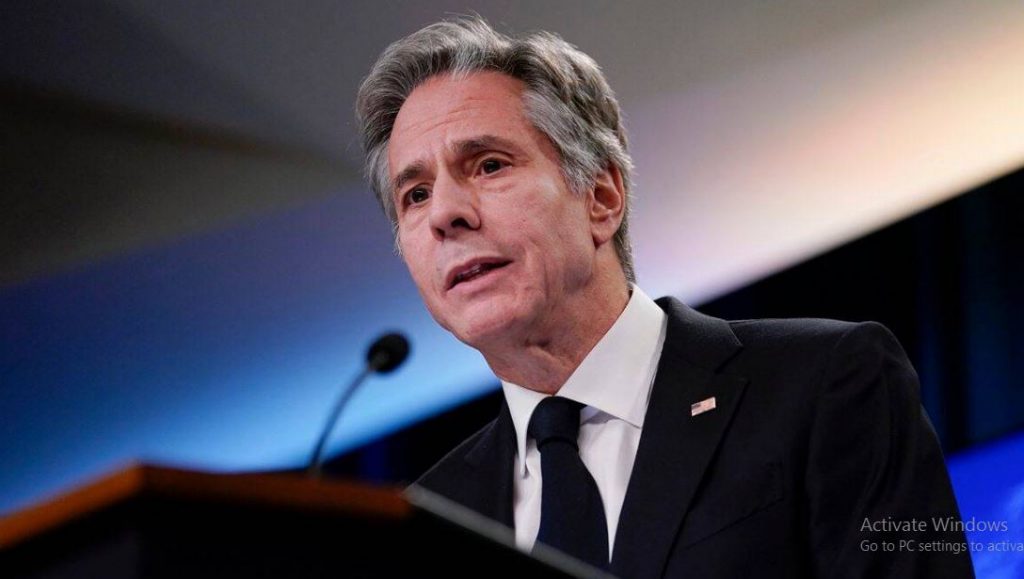Davos: US Secretary of State Antony Blinken reiterated the need for a “pathway to a Palestinian state” during a talk Wednesday at the World Economic Forum’s annual meeting in the Swiss ski resort of Davos, saying Israel would not “get genuine security absent that.”
If Israel can be brought into the fold of the Middle East, Blinken said, the region would be coming together to isolate Iran, which he called “the biggest concern in terms of security,” as well as its proxies. Those include Yemen’s Houthi rebels who have been attacking commercial ships in the Red Sea.
“The problem is getting from here to there, and of course, it requires very difficult, challenging decisions. It requires a mindset that is open to that perspective,” Blinken said.
He said what is different now is the mindset of leaders in the Arab and Muslim world on integrating Israel into the region and that he feels “a fierce urgency” because “we’re in the midst of what is human tragedy in so many ways in the Middle East right now — for the Israelis and Palestinians alike.”
His comments come as a key Iranian official graces the same hallways of the glitzy event in the Alpine snows of Davos: Iranian Foreign Minister Hossein Amirabdollahian is sitting down for a one-on-one chat with CNN’s Fareed Zakaria later Wednesday.
A day earlier, Saudi Arabia’s foreign minister, Prince Faisal bin Farhan, said during a Davos panel that his country agreed “regional peace includes peace for Israel” and responded “certainly” when asked if Saudi Arabia would recognize Israel as part of a larger political agreement.
“But that can only happen through peace for the Palestinians, through a Palestinian state,” he said.
Israeli Prime Minister Benjamin Netanyahu leads a right-wing government that is opposed to Palestinian statehood, and Netanyahu himself recently said that his actions over the years prevented the formation of such a state.
Blinken said Israelis would need to decide on their leadership and direction, saying it’s up to them whether the country can “seize the opportunity that we believe is there.” He called this “an inflection point” for the Middle East that requires hard decisions.
The leaders of France, Argentina, and Spain also will deliver speeches on a busy second day of the elite gathering, where heads of state mingle with corporate executives, activists, and more.
Those at Davos are taking up other weighty issues of the day, such as artificial intelligence and climate change. UN Secretary-General Antonio Guterres, speaking at the event, has continuously called for the world to take more united action against global warming.
“Let me be very clear — the phaseout of fossil fuels is essential and inevitable,” Guterres said in a speech.
He cited scientists’ recent findings that last year was the hottest on record and warned that “droughts, storms, fires and floods are pummeling countries and communities.”
To combat those effects, Colombian President Gustavo Petro called for an “American pact” between the neighbouring continents on developing clean energy sources.
“There are two paths forward,” Colombia’s first leftist leader said during a panel on Latin America. “We continue to separate into a North that pollutes more and more … and a South that fails to develop its potential … (or) there is another way based on a coming together in search of common goals.”
Another South American leader, new Argentine President Javier Milei, faced a crowd of reporters who tailed him as he arrived in the Davos conference centre and ducked into a side meeting room.
Meanwhile, Pope Francis urged business leaders at Davos to “be increasingly guided not simply by the pursuit of fair profit, but also by high ethical standards” because national governments cannot regulate the global economy for the common good.
The pope sent a letter to Davos organizers saying wars worldwide show the need to tackle what he called the root causes of conflicts: economic injustices, hunger and exploitation of natural resources.
Blinken, after meetings Monday with Ukrainian President Volodymyr Zelenskyy and others, was asked in a conversation with New York Times columnist Tom Friedman whether Jewish lives matter more than Palestinian lives. He responded, “No, period.”
“What we’re seeing every single day in Gaza is gut-wrenching,” he said.
To ease that suffering, the US is pushing to get more humanitarian assistance to Palestinians, minimize civilian casualties and impress upon Israel its responsibility to ensure that is the case, Blinken said.
South Africa has formally accused Israel of committing genocide against Palestinians and pleaded with the top UN court to order an immediate halt to Israeli military operations in Gaza.
Israel has responded by calling its war a legitimate defense of its people and saying Hamas is guilty of genocide, focusing on the militant group’s October 7 attack that triggered the war.
Hamas and other militants killed some 1,200 people, mostly civilians, and captured around 250. Amid a barrage of bombings and intense fighting, over 24,000 Palestinians have been killed since the start of the war, Gaza’s Health Ministry says.
France, along with Qatar, helped mediate an agreement to ship medicine into Gaza for dozens of hostages held by Hamas. The shipment is due to arrive Wednesday, the same day French leader Emmanuel Macron will speak in Davos.
Recently reappointed Spanish Prime Minister Pedro Sanchez and Milei — Argentina’s self-described “anarcho-capitalist” president — also will take the podium.
AP
